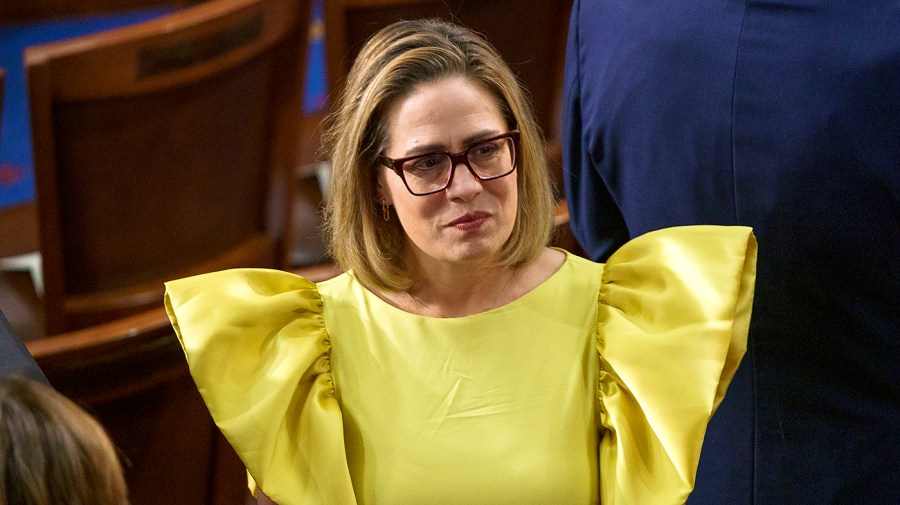Biden to trigger tax fight Senate Democrats don’t want
President Biden will trigger a fight over raising taxes when he introduces his budget plan next week, something that Senate Democrats who face a tough road ahead to protect their majority aren’t clamoring for, especially in West Virginia, Montana and Arizona.
Democrats campaigned on repealing the Trump-era tax cuts ahead of the 2020 election but fell short after Sens. Kyrsten Sinema (I-Ariz.) and Joe Manchin (D-W.Va.) balked at key elements of Biden’s tax plan, such as raising the corporate tax rate to 29 percent and the top marginal income tax rate to 28 percent.
Talk of repealing any of the Trump tax cuts before the 2024 election had fallen off the table and Senate Democrats have recently steered clear of insisting that any deficit reduction plan that comes before Congress this year include big tax increases.
Now Biden is putting the topic back in the national spotlight.
“I want to make it clear: I’m gonna raise some taxes,” Biden declared at an event in Virginia Beach on Tuesday, previewing his March 9 budget proposal.
Biden pledged that “no one … making less than $400,000 is going to pay a penny more in taxes.”

President Joe Biden speaks to the House Democratic Caucus Issues Conference, Wednesday, March 1, 2023, in Baltimore. (AP Photo/Evan Vucci)
But putting tax increases front and center when Democrats have to defend 23 Senate seats in the next election is causing jitters because Republicans are sure to latch onto Biden’s proposal to try to paint the Democratic Party at large as a bunch of tax-and-spend liberals.
There’s little desire among Democratic lawmakers on Capitol Hill to put vulnerable incumbents such as Sinema, Manchin and Sens. Jon Tester (D-Mont.) and Sherrod Brown (D-Ohio) in a tough political position when there’s no chance of getting tax hikes through the Republican-controlled House.
“We haven’t gotten that far,” said Sen. Debbie Stabenow (D-Mich.), a member of the Democratic leadership and the Finance Committee, when asked if Democrats would insist on adding a revenue-raising package to a year-end budget deal.

Democrats are worried that Sen. Kyrsten Sinema and some other incumbents key to keeping the majority in the Senate could be vulnerable if tax increases are proposed. (Greg Nash)
She said that Democrats are mostly unified in opposition to adding any deficit-reduction deal to legislation raising the federal debt limit, which needs to pass before the August recess.
Tester, who announced his reelection plans last week, says he could favor proposals to increase “tax equity” but he would not support anything that would raise taxes for lower- and middle-class families.
“I don’t know what he’s going to raise taxes on, that’s critical,” Tester said of Biden’s pledge to raise some taxes.
“If it’s about tax equity we’ll take a look at it. If it’s about across-the-board tax increases for everybody it’s probably the wrong time to do it because of inflation,” he added.
Tester said the possibility of a recession caused by rising interest rates is “of course” a reason to be cautious about raising taxes.
Manchin, who hasn’t yet decided whether to run for reelection in West Virginia, which Donald Trump carried by huge margins in 2016 and 2020, waved aside a question about raising taxes in a deficit reduction package.
When asked about adding tax hikes to a deficit-reduction deal, he said “we ought to be worried about the $31 trillion debt and how we got here so quick.”
Manchin punched holes into Biden’s tax plans in the last Congress by saying he would only support raising the corporate tax rate to 25 percent, instead of the 28 percent level favored by Biden.
He also shot down the president’s plan to impose a 20 percent minimum tax on billionaires.
Instead of playing defense on tax policy, Senate Democrats want to go on offense by attacking Republicans for backing reforms that would effectively cut Social Security and Medicare benefits.

Sen. Joe Manchin (Greg Nash)
Yet, Biden will trigger a major discussion over raising taxes next week when he will submit his fiscal year 2024 budget proposal to Congress, which the president says will cut $2 trillion from the federal deficit.
“I will not raise taxes on anyone making under $400,000 a year. And I will pay for the ideas I’ve talked about … by making the wealthy and big corporations begin to pay their fair share,” Biden said at his State of the Union address, previewing his budget proposal.
Sen. Ben Cardin (D-Md.), a member of the Finance Committee, said Biden’s plan will include many of the same proposals he pushed in 2021 and 2022, but they have virtually no chance of passing a divided Congress.
He said Democrats tried to unwind the Trump-era tax cuts and “got as far as I think we could.”
“As far as the effort we made last Congress to undo some of the rates from the 2017 [tax law] we were unsuccessful and we had control of the House. I don’t see us getting very far this year,” he said.
Democratic lawmakers have shown much less appetite this year for a deficit-reduction package than 2011, the last time there was a standoff over raising the debt limit in Washington.
Then-President Obama proposed in April of 2011 cutting the deficit by $4 trillion over 12 years. He suggested $2 trillion in spending cuts across the budget combined with $1 trillion in tax increases that would lower interest payments on the debt by $1 trillion.
This year, however, Democrats are quick to argue that they addressed the deficit by enacting the Inflation Reduction Act last year, which they say will reduce the deficit by $300 billion.
“We Democrats have already walked that walk. In the [Inflation Reduction Act] that was the first major bill that reduced the deficit by $300 billion. In the last year with the Biden administration we reduced the deficit by more than in the Trump years,” Senate Majority Leader Chuck Schumer (D-N.Y.) told reporters Wednesday.
He said “there’s close to unanimity if not unanimity in our caucus that the Trump tax cuts were extremely bad for the country.”
Senate Republican Whip John Thune (S.D.), an author of Trump’s 2017 tax bill, said he doesn’t see much desire among Senate Democrats to revisit those tax cuts ahead of a pivotal presidential election.
He said Democrats “should be” gun shy about raising tax rates because “record revenues are coming in” under the current rates.
Thune instead floated the possibility of a year-end budget deal that would extend bonus depreciation and research and development tax credits, which are top priorities for businesses and many Republican lawmakers.
He said Democrats are demanding in return a renewal of the expanded child tax credit that expired at the end of 2021.
Combining extensions of the bonus depreciation and research and development tax credits from the 2017 Trump tax law with a renewal of the expanded child tax credit would add substantially to the deficit if enacted into law.
Copyright 2023 Nexstar Media Inc. All rights reserved. This material may not be published, broadcast, rewritten, or redistributed. Regular the hill posts







